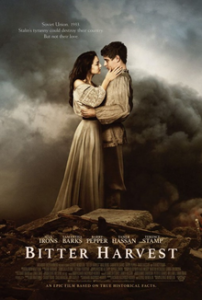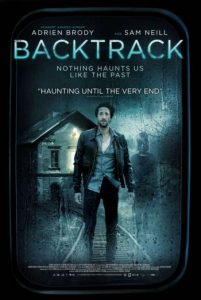About twenty minutes into George Meneluk’s Bitter Harvest, you can’t help but feel the film is moving slightly fast. Barely developed characters are killed off without much warning or mourning; emotive lines of dialogue are hastily delivered without sufficient context, while conflicts emerge in relationships we know little about.
It’s a bit messy, but in hindsight it primes the audience for what they’re about to see: more killing, more emotional anguish, and more personal conflicts. Indeed, once the vibrant colours of the film’s dream-like opening sequence fade into dark shades of grey, the film becomes a relentless barrage of suffering.
Despite being billed as a love story, Bitter Harvest is a brutally violent film that depicts the events of Holodomor, one of the darkest chapters in Ukraine’s history. Set in the 1930s, during the days of Stalin’s Soviet reign, the film zeroes in on a modest Ukranian town affected by government-inflicted famine and oppression.
The romantic elements of the film are captured by leading characters Yuri (Max Irons) and Natalka (Samantha Barks), childhood lovers torn away from one another by the crisis. Irons does justice to his likeable lead, who evolves as his situation worsens. Barracking for Yuri offers the audience some hope amidst the horrors inflicted by the Soviets, although the emphasis on his longing for Natalka is perhaps overstated by the film’s marketing department.
Bitter Harvest is successful at drawing attention to Stalin’s famine-inducing agricultural policy and the brutal practices of the Kremlin during his reign. As a historical piece, however, it is shallow on politics, preferring to tell the story mostly through the lens of its victims. When Stalin (Gary Oliver) makes appearances, he is portrayed as a one-dimensional evil figure. That might not be far from reality, but the film leaves little room for audiences to better understand the reasons for the famine; instead, they are merely informed that the Holodomor genocide happened and that it was a disaster. As an aside, there’s something off-putting about hearing Josef Stalin and his comrades speak in American accents.
Given its subject matter Bitter Harvest is a necessary production, yet it fails to deliver the same punch as similar historic episodes re-told through film. While it’s refreshing to see a film of this genre contained within 100 minutes, the limited duration – coupled with a lack of focus and inconsistent pacing – unfortunately denies cinema-goers the opportunity to emotionally connect with its embattled characters, or to intellectually connect to the overarching political narrative.
Bitter Harvest is in selected cinemas from 23rd February through Becker Film Group.





